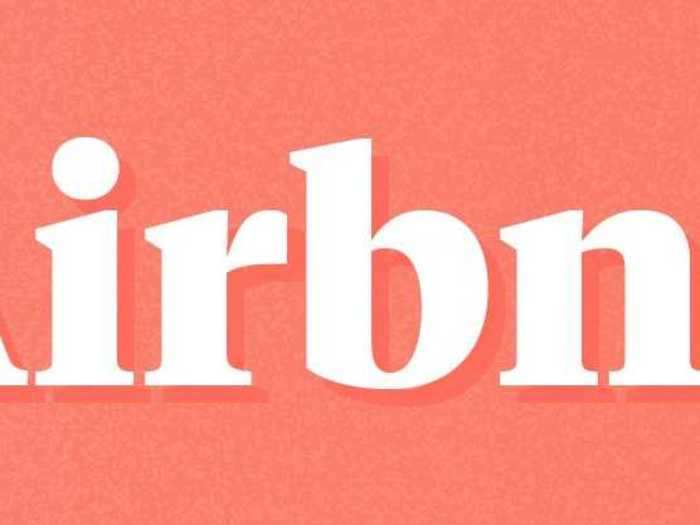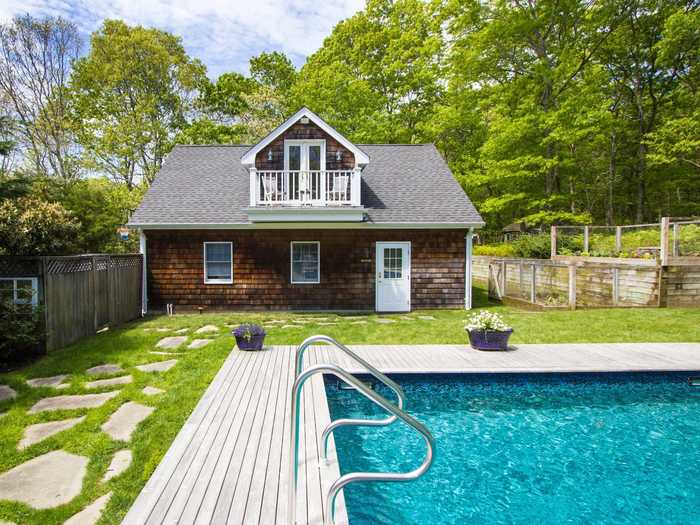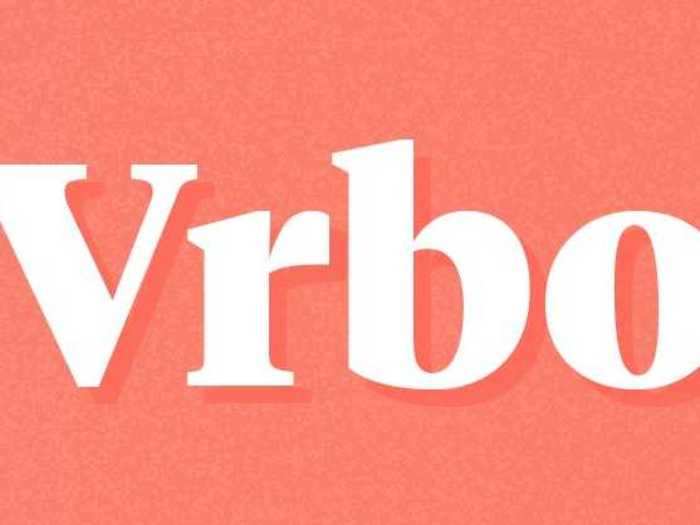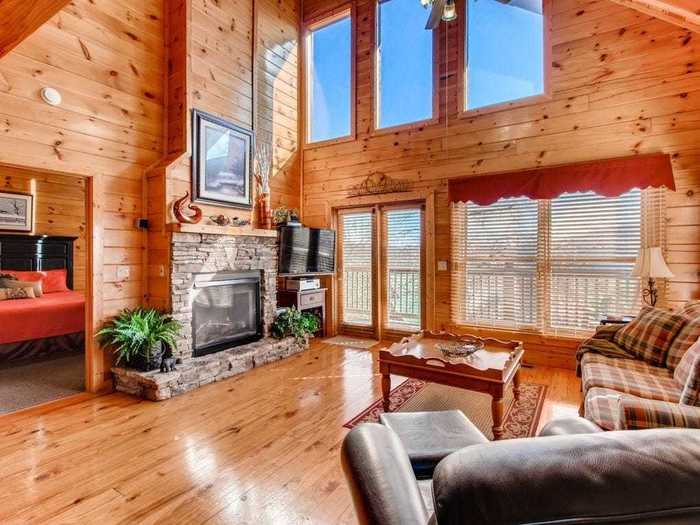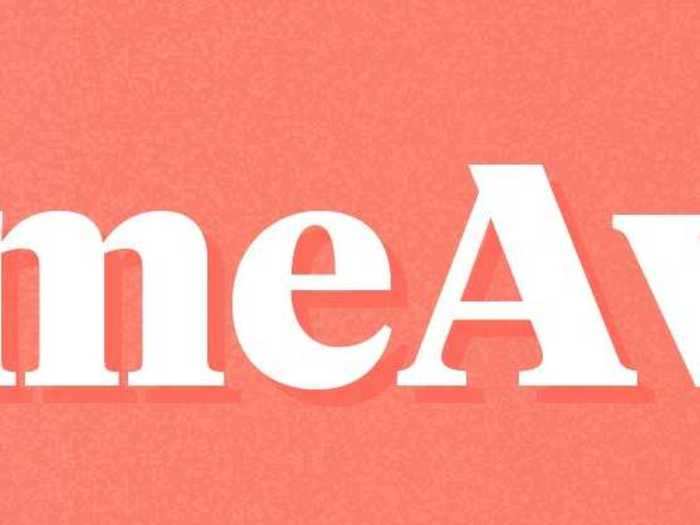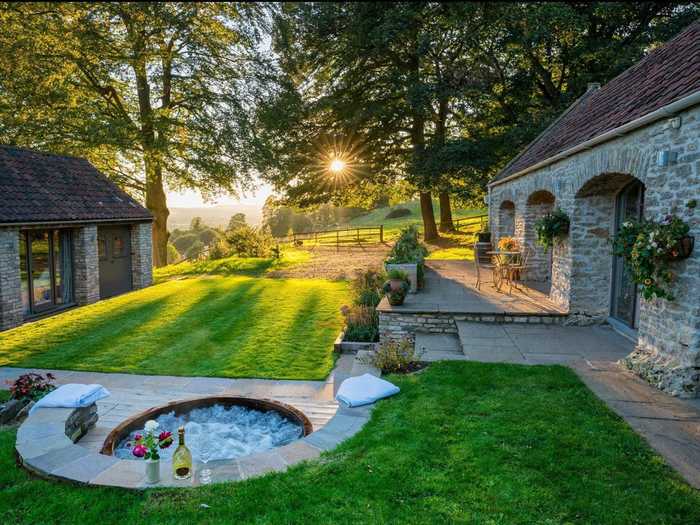When you buy through our links, we may earn money from our affiliate partners. Learn more.
- As travelers return to travel following the novel coronavirus, many are likely to choose private lodging options over far-flung trips in order to promote social distancing.
- Companies like Airbnb, HomeAway, and Vrbo are all private vacation home rental platforms implementing new COVID-19 policies to keep travelers safe.
- We've broken down the differences between Airbnb, HomeAway, and Vrbo by looking at search filters, booking policies, cleanliness guidelines, and updated protocols surrounding the guest experience.
Table of Contents
When you're booking a vacation, choosing to stay with a trusted company or provider is essential. This is especially true as the world continues to grapple with COVID-19, which continues to make travel unpredictable.
And while we're big fans of hotels — and have definitely logged enough nights reviewing them — the lodging landscape, in particular, has felt the ramifications of the pandemic. Many brands from boutique to big-name have had to adapt quickly, including by changing how they think about hotel design and implementing stringent new policies.
Prior to the pandemic, a certain type of traveler might have preferred hotels over Airbnbs as their primary lodging choice. But now, as social distancing becomes the norm, many are likely to rethink that approach. That's because when you book an entire home, it's sheltered from interaction with staff and other travelers. They also make for easy driveable getaways.
Plus, booking a local home or apartment offers added residential comfort with the full amenities of home (or, you know, a castle), in addition to contactless amenities like self-check-in.
But vacation home rental options aren't limited to just Airbnb. Other sites, like HomeAway and Vrbo, are credible companies that operate with the same idea: homeowners rent out properties they're not using to travelers looking for a place to stay. These sites all offer plenty of options ranging from quirky tiny homes to super-luxe chalets. Do note, however, that HomeAway is actually part of Vrbo, so the sites often share overlapping listings and policies. In fact, the two platforms will merge under Vrbo this summer.
While there are, understandably, many concerns about whether travel is safe right now, these platforms are all implementing strict new policies (just keep in mind there might be higher cleaning fees now to coincide with such stringent sanitizing measures) in response. We've broken down how each of these three vacation home rental companies works, plus their policies for cleaning, cancellation, and more.
Wherever you travel, be sure to check for local policies regarding travel and quarantine periods, which may prohibit some out-of-state visitors. And remember, without a vaccine, there is no firm guarantee on safety, and it's crucial to follow guidelines from organizations such as the CDC and WHO, and wear a mask, wash your hands, and maintain social distancing.
Travel Hotel Reviews Sub banners Airbnb
BI
Airbnb: Booking processes, cancellation policies, and cleanliness guidelines
Airbnb
Book a private home rental on AirbnbUnlike other companies that only offer rentals for whole private homes, Airbnb offers entire homes and apartments, as well as private and shared rooms with more than 7 million listings worldwide.
Although Airbnb has come under fire for contributing to over-tourism and crowding out local renters in places like Amsterdam and Paris, it remains popular with hosts and guests for its navigability and emphasis on building local connections that will ground visitors in a place.
In the time of COVID-19, Airbnb has attracted new users — and retained its older ones — as people opt for accommodations that limit exposure to others and don't require interaction with staff or other guests to the same degree hotels do. And despite the pandemic, users are still keen to book. According to company data, more guests were booking six months out than at the same time the previous year.
Part of this is due to new measures the company has put in place as it continues to adapt to the pandemic, which includes an Enhanced Cleaning Initiative and an Extenuating Circumstances policy, detailed below.
If you're considering booking an Airbnb now or in the future, here's what you should know about the platform:
The Airbnb Booking Process
- Search for homes based on location, price, date, the number of bedrooms or bathrooms, amenities, and more.
- When searching for a private home rental, users may sort stays to filter those that offer flexible cancellation policies, and also view the host's cancellation policy on the listing page.
- According to Airbnb, guests will soon be able to search by filters to view only hosts who have completed the Enhanced Cleaning Initiative, detailed below.
- Listings that are certified with the Enhanced Cleaning Initiative will display a badge in the listing. If there is no badge, the host does not participate. Here's a detailed look at how to know if the home you're considering participates.
- Airbnb now has a quick guide to purchasing travel insurance to travel with confidence.
Airbnb Cancellation Policies
- Reservations made for stays on or before March 14, with check-in dates between March 14 and July 31, are covered by the company's Extenuating Circumstances policy. This means bookings may be canceled because of COVID-19-related reasons before check-in for a full refund or travel credit, if available. Applicable bookings will also receive a refund or travel credit for all service fees. Guests might need to justify why they have an extenuating circumstance, and in some cases, provide documentation.
- Reservations made after March 14 are considered to be booked under the host's usual cancellation policy, which falls into one of several Airbnb-created templates running from a flexible policy with a full refund for cancellations at least 14 days out, to a strict one with only a 48-hour window after booking to receive a refund. Reservations made on or before March 14 with a check-in date after July 31 are also not covered under this policy (the host's stated cancellation policy applies).
- There is one exception: if either the guest or the host becomes sick with COVID-19. In that case, the Extenuating Circumstances policy comes into effect. Guests may then request a full refund or travel credit to rebook, and hosts can cancel without a fee or losing their Superhost status.
- To determine the cancellation policy for vacations you've already booked, log into your account and go to the Trips page. From there, you may select the trip you're looking for and view the cancellation policy. Normal cancellation policies for short-term stays of less than 28 days include the following:
- Flexible: This is the safest option. Free cancellation is available up to 14 days before check-in. If the reservation is booked less than two weeks out, then guests have 48 hours after booking to cancel. After that window, guests may still cancel up to 24 hours before check-in for a full refund minus the service fee.
- Moderate: Guests may cancel a reservation up to 14 days before check-in. If the booking is made less than two weeks before the trip, but more than five days before it starts, there's a 48-hour period for guests to cancel for free. If made less than five days before a trip, guests who cancel will lose the first night's rate plus half of the total of the remaining nights. According to the Airbnb website, those who leave their stay early forfeit the nightly rate for 24 hours after canceling, then receive 50% of the nightly rate for the remaining nights not spent.
- Strict: Guests may cancel a reservation within 48 hours of booking for stays beginning 14 days out. If the booking is made between 14 days and seven days before check-in, guests can receive a refund for 50% of the total nightly rate and cleaning fee, but will forfeit the service fee. Guests do not receive a refund if the cancellation is less than seven days before the stay, or if they leave early.
Airbnb Cleanliness Guidelines
Airbnb launched an Enhanced Cleaning Initiative in May that the company calls "the first overarching standardized guidelines for cleaning and sanitization in the home-sharing industry." Here's a detailed look at how to know if the home you're considering participates.
This initiative includes extra protections to keep guests safe, and all hosts are strongly encouraged to participate, in addition to following local guidelines. The program lays out a five-step cleaning process and includes reference checklists for cleaning each room.
While not required, hosts may log on to review the guidelines and take a quiz, and confirm they'll comply with the protocol. Those who certify receive a special call-out in their profile where it's easy for guests to see.
According to Airbnb, while this is optional, "we believe our hosts are committed to comply with the policies and requirements of the program." According to internal company data, 94% of all Airbnb reviews showing that guests are satisfied with the cleanliness of their listing, will score it as 4 or 5 stars after their stays.
Guidelines include:
- 24-hour waiting periods between guest checkout and the cleaners' arrival
- Guidelines for the use of personal protective equipment including the use of masks, aprons, shoe covers, and gloves by cleaning crew
- Disinfectants approved by regulatory authorities
Educational materials for hosts are available in 12 countries as of publishing: Australia, Brazil, Canada, France, Germany, Italy, Japan, Korea, Mexico, Spain, the United Kingdom, and the US (more are expected in the coming days).
There's also a second option for hosts unwilling to complete the strict protocol above, called "Booking Buffer. It was what the company used for its Frontline Stays project, which housed medical workers and first responders. This protocol's guidelines include:
- A 72-hour period between guests, with only cleaning allowed during that time
- A 24-hour waiting period between guest checkout and cleaners' arrival, plus another 48 hours before guests can enter the property
- Adherence to CDC recommendations and local guidance
Again, both programs are optional, so guests should always confirm with the host which protocol a listing meets, or if they don't participate in any formal program at all.
Travel Hotel Reviews Sub banners Vrbo
BI
Vrbo: Booking processes, cancellation policies, and cleanliness guidelines
VRBO
Book a vacation home rental on VrboVrbo, which stands for vacation rental by owner, has been renting vacation homes for 25 years and is now owned and operated by Expedia Group, which also owns HomeAway.
Vrbo rents both whole properties and private rooms in guest houses and B&Bs. Vrbo tends to be the better-known brand compared to HomeAway, according to internal data from the company, while HomeAway is typically more popular in the UK, where Vrbo isn't available yet.
The two platforms are identical in all but name and share the same properties, cancellation policies, and COVID-19 protocols, with millions of homes around the world. A range of lodging is available, with cozy cabins proving especially popular in the pandemic, as well as these 10 cities for holiday weekend getaways.
The platform is also especially popular with families: 87% of Vrbo guests travel with a family member, according to a recent internal survey. While Airbnb has plenty of small city flats and studios that are great for solo travelers and couples, Vrbo properties tend to run much larger and with more offerings in non-urban destinations. According to a Vrbo internal analysis, 70% of Vrbo and HomeAway properties are big enough to include two or more bedrooms and the average listing sleeps six.
Like Airbnb, there are plenty of filters to help guests narrow down their ideal stay or expand the search. Here's how Vrbo works:
The Vrbo Booking Process
- Handy search options include being exact or flexible on the number of bedrooms, the ability to search a whole country, and filters for nearby activities like hiking and winery tours.
- Search for properties specifically recommended for families, and other filters based on location, price, date, amenities, property type, and more.
- Vrbo recently launched specific new search filters so guests can easily find stays aligned with their personal COVID-19 boundaries which include those that are "Highly Rated for Cleanliness," specific cleaning practices outlining buffer window between guests and check-in policies (amount of host contact, if self-check-in, etc.), vacation rentals with the highest cleanliness reviews from travelers, and flexible cancellation policies.
- A new "staycation" landing page encourages guests to conduct searches close to home and highlights local destinations and properties.
- According to the company, partners who encourage travelers to break local laws or dismiss COVID-19's severity can get kicked off both Vrbo and parent company Expedia's platforms.
Vrbo Cancellation Policies
- Vrbo responded to COVID-19 with an emergency cancellation policy for bookings made before March 13 for stays scheduled to take place between then and June 30. It continues to apply until July for bookings that need to be canceled due to government-implemented travel or lodging restrictions.
- The company is encouraging partners to provide full refunds or flexible rebooking credit to those who must cancel bookings, with a partial refund strongly encouraged if a credit can't be accommodated.
- 100% of the money Vrbo makes from traveler service fees gets refunded if travelers have to cancel a trip due to "local governments enacting laws that restrict travel or prohibit stays in vacation homes due to COVID-19."
- While the company makes clear that property hosts aren't obligated to go beyond their stated cancellation policy in the case of COVID-19 related disruptions for bookings in these windows, those who offer more generous refunds get rewarded with increasing amounts of visibility in booking searches. According to Vrbo, the "vast majority" of hosts and property managers have gone outside of their policies to help travelers. To check on the cancellation policy for an existing booking, log into your account, go to "My Trips," select your booking, and navigate to the "Details" tab.
- Bookings made after March 13 or beginning July 1 fall under the host's normal cancellation policy, which can be one of several options. Normal cancellation policies range from relaxed to no refunds for any reason, and you can easily find them both on the bookings sidebar or detailed in the "Policies" section of the listing's page.
- Relaxed: Bookings canceled at least 14 days before the start of the stay receive a full refund. Those canceled at least seven days in advance receive a 50% refund.
- Moderate: Bookings canceled 30 days or more from check-in receive a full refund. Two weeks or more from check-in and guests can receive a 50% refund.
- Firm: Bookings canceled 60 days out receive a full refund; then guests can receive a 50% refund until 30 days before check-in.
- Strict: Bookings canceled 60 days before the start are refunded in full.
- No refund: No refunds are possible for any reason.
Vrbo Cleanliness Guidelines
According to the company, COVID-19-specific cleanliness guidelines for homeowners, property managers, and homeowners were put in place after consultation with government, travel, and medical experts, and have been reviewed by an expert through the Infectious Diseases Society of America. Vrbo was also part of the team that helped the US Travel Association task force and Vacation Rental Management Association develop guidelines.
The extensive suggested guidelines for Vrbo properties are based on the Centers for Disease Control and World Health Organization recommendations and include the following:
- Guidelines for property managers and homeowners about how to disinfect high-touch surfaces.
- Contactless, self-check-in, and check-out.
- Training for house cleaners.
- Supplying soap and hand sanitizers to guests, including at property entry points.
- Building in time so there aren't back-to-back stays.
Keep mind, however, that these guidelines aren't mandated: "There is no way for Vrbo to repeatedly inspect millions of properties, so the most helpful thing we can do is to arm our homeowners and property managers with information and instruction on what to do, and arm families with the information they need to feel comfortable booking a place to stay," says a spokesperson for the company.
Guests can also message a host using the platform to ask about cleaning practices. According to the company, former guests have already provided cleanliness reviews on 900,000 Vrbo properties.
However, if a place is found to be misrepresenting the level of cleanliness and hygiene they claim to uphold, Vrbo will take down that listing's cleanliness badge to be more responsive to guest feedback.
Travel Hotel Reviews Sub banners HomeAway
BI
HomeAway: Booking processes, cancellation policies, and cleanliness guidelines
HomeAway/Facebook
Book private vacation home on HomeAwayHomeAway is another member of the vacation home-rental space and launched in 2005, 10 years after its sister company Vrbo. In summer 2020, both companies will merge together under Vrbo. Until that happens, HomeAway will continue to operate under the same umbrella and be identical in all but name. The two platforms share around 2 million homes in 190 countries, about one-third of Airbnb's listings.
The search process for HomeAway is exactly the same as it is for Vrbo, with identical search pages featuring the exact same layout and filters. Here's how it works:
The HomeAway Booking Process
- The entire process is identical to that outlined previously for Vrbo. Search by home type (castles, chalets, rooms in a guesthouse, bungalows), or filter by price, amenities, cancellation policies, nearby activities like tennis and skiing, and more.
- Just as with Vrbo, HomeAway offers search features designed for guests to easily find properties aligned with their personal COVID-19 boundaries.
- HomeAway properties also feature a Cleanliness Badge so guests may distinguish those with high guest ratings for cleaning.
- Guests may use a specific search filter to find stays with flexible cancellation policies, which are clearly outlined on the listing.
- Listings include if parties and events are allowed at the property.
HomeAway Cancellation Policies
- HomeAway uses the same cancellation policies for both COVID-19-related and non-COVID-19-related cancellations as its sister company Vrbo.
- The COVID-19 emergency policy only covers bookings made before March 13 for stays between May 1 and June 30. It comes into effect if local governments enact laws that restrict travel or prohibit vacation stays for leisure.
- Bookings made after these dates revert to the host's cancellation policy, which is located on listing pages both in the booking sidebar and detailed in the "Policies" section of the listing.
- Find out a host's cancellation policy for existing booking by logging into your account, going to "My Trips," selecting the booking, and navigating to the "Details" tab.
- Standard cancellation policies outlined in the above Vrbo section also apply to HomeAway properties. Like Vrbo, HomeAway is asking hosts to offer a full credit for guests who need to cancel outside of the usual cancellation window, though guests must discuss it with the property manager.
- If a credit isn't possible, partial refunds are "strongly encouraged," though hosts aren't strictly obligated to go above and beyond the rental agreement terms. HomeAway explicitly states that if the manager is unwilling to cancel or issue a refund, the decision is "ultimately up to the owner or property manager." However, as with Vrbo, most have accommodated guests outside of their own cancellation policies.
- Keep in mind that refunds might take up to four weeks to be applied due to the volume of travel disruptions.
HomeAway Cleanliness Guidelines
HomeAway is encouraging hosts to follow the same cleaning protocols outlined for sister company Vrbo. Just as with Vrbo, these are recommendations, and are not mandatory. Guests won't know for sure if a host is following them but asking directly and reading reviews is always a good idea.
Most listings with a Cleanliness Badge, however, include an outline of cleaning practices, including buffer time between guests and if self-check-in is available. More than 100,000 listings between both companies have opted in to sharing this information so far and follow guidelines that include:
- Contactless self-check-in for guests.
- Waiting at least three hours before entering the property to clean.
- An outlined cleaning process that incorporates a first clean with a detergent followed by disinfection with a chemical disinfectant.
- Having soap and sanitizer available to guests especially at entry points.
- Removing shoes and leaving them at the entrance to the property when possible.
- Allowing a buffer zone of at least one day between guests.
As with Vrbo, cleanliness levels can never be guaranteed, as according to the company, it would be nearly impossible to conduct ongoing checks of rental properties.
However, the company is responsive to guest feedback and will take down any cleanliness claims if the host is found to mislead the level of sanitation promised.

